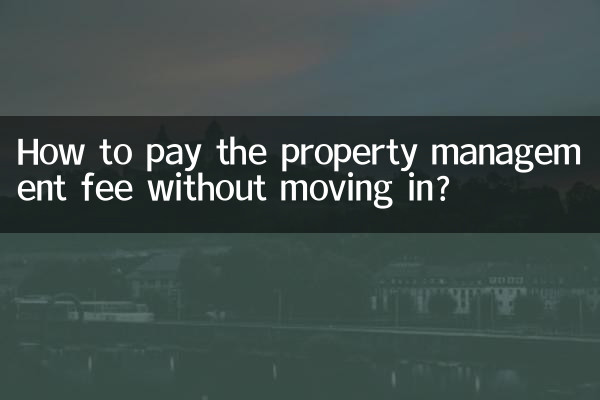Title: How to pay the property management fee without moving in? Analysis of common questions and solutions for owners
introduction:
In recent years, disputes over property management fees have arisen frequently, especially the issue of property fee payment for unoccupied houses has become a hot topic. Many owners have questions about the payment of property fees because they have not moved in for a long time or have been delayed in handing over their properties. This article combines the hot topics on the Internet in the past 10 days, sorts out relevant policies and regulations and actual cases, and provides clear answers to owners.

1. Do I need to pay property fees if I don’t move in? Legal basis
According to the relevant provisions of the "Property Management Regulations" and the "Civil Code", the payment of property fees is not directly related to the actual occupancy. As long as the developer completes the handover procedures, the owner must bear the property fee obligation. The following are the key legal terms:
| legal documents | Related terms | core content |
|---|---|---|
| "Property Management Ordinance" | Article 41 | The owner should pay fees as stipulated in the property service contract |
| Civil Code | Article 944 | If the property management company has provided services, the owner shall not refuse to pay on the grounds that the services have not been received. |
2. Three common scenarios for paying property fees before moving in
| scene type | Fee calculation method | Examples of local policies |
|---|---|---|
| Rough house without decoration | Pay in full (most areas) | Jiangsu: 30% reduction can be negotiated |
| No check-in in the finely decorated room | Pay in full | Shenzhen: If vacant for 6 consecutive months, you can apply for a 30% discount |
| Delayed delivery period | borne by the developer | Universal nationwide (subject to the delivery notice) |
3. How to legally reduce property fee expenses?
1.Apply for vacant house discount:Some cities allow owners to enjoy discounts after providing proof of zero use of water, electricity and water. For example, Shijiazhuang stipulates that vacant houses are subject to 70% payment.
2.Negotiate installment payment:Sign a supplementary agreement with the property company and agree to pay quarterly or semi-annually.
3.Check the charges:Refusal to pay extra-contract fees (such as decoration management fees, parking space lock installation fees, etc.).
4. Hot controversial cases in 2023
| Case location | focus of controversy | Court decision |
|---|---|---|
| Hangzhou | Owner refuses to pay property fees for vacant house for 5 years | Full payment + liquidated damages |
| Chengdu | Developer’s fees for delayed delivery period | borne by the developer |
| Guangzhou | Property management increases fees for vacant houses without authorization | Double refund for overcharged portion |
5. Things to note when safeguarding the rights of owners
1.Keep evidence:Vacant houses require regular photos of water and electricity meter readings and door lock status.
2.Written communication:Any negotiations must be sent via EMS for record keeping.
3.Complaint channels:Prioritize complaints to the Property Department of the local Housing and Urban-Rural Development Bureau (which is more efficient than court litigation).
Conclusion:
Although property fees are still required for unoccupied properties, owners can reduce expenses through legal means. It is recommended to pay close attention to changes in local policies, such as the new regulations on exemptions and exemptions for vacant houses that Shandong Province plans to introduce recently. While reasonably safeguarding your own rights and interests, you should also avoid affecting your personal credit due to arrears.

check the details

check the details